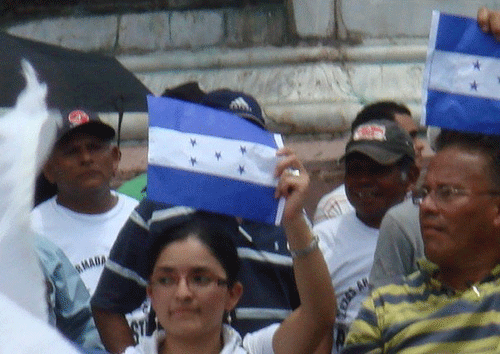Reading Time: 4 minutesAugust 20, 2009
Since the Honduran military seized and expelled President Manuel Zelaya, the country’s de facto government has been losing the battle for international legitimacy. De facto President Roberto Micheletti and his allies have tried to convince the world that Honduras experienced a “constitutional succession,” not a coup. But beyond failing to show how expelling a sitting president squares with the constitution, the Micheletti camp has failed in the realm of diplomacy.
In the last few weeks, both the United States and Mexico stripped a number of Micheletti’s diplomatic and government appointees of their posts and visas. Nearly two months after the coup, the pro-Zelaya camp retains the key ambassadorships, including the United States, the United Nations, and the major players in Latin America. Without any major Honduran embassy to count on, the sitting Honduran government does not have at its disposal spokespeople to protect national interests abroad—a problem for a government that finds itself in need of support more than at any time since the 1980s.
The current Honduran imbroglio presented ambassadors with the dilemma of whether to support the deposed president or the newly-installed leader, weighing political allegiances against career aspirations. Ambassadors, dependent on the politicians who appoint or remove them, lack domestic constituencies and live at the mercy of elected politicians at home.
With this coup, Honduran ambassadors suddenly faced a high-stakes decision. Unlike old-style coups—where the military simply takes power and replaces diplomats and other democratic representatives—Honduran ambassadors were not immediately dismissed. Instead, the Micheletti government wanted to maintain a semblance of continuity, giving ambassadors a significant degree of autonomy but forcing them to choose which master to follow.
Adding to the complexity of the situation, Micheletti, like President Zelaya, is a member of the Liberal Party. This party identification generated greater ambiguity in diplomats’ allegiances and enabled the new government to gain support from certain Zelaya appointees. Zelaya also had alienated most of Honduras’ political establishment over the past year. So, while some may have stuck with Zelaya because he appointed them, this decision was not self-evident.
Ambassadors have faced a tough decision, but three factors have made supporting the Micheletti-run government riskier than supporting President Zelaya. First, the international community has resoundingly condemned the coup. Outside Honduras, President Zelaya holds both the moral high ground and the official recognition of other states and multilateral bodies.
For example, when the sitting Honduran ambassador to the United States, Roberto Flores Bermúdez, acknowledged Micheletti’s government as the result of the legitimate ousting of a president who had broken the law, Zelaya was able to replace him with Eduardo Enrique Reina. Meanwhile, Micheletti’s efforts to recall and replace pro-Zelaya ambassadors like Rosalinda Bueso Asfura (ambassador to Mexico) and Jorge Arturo Reino (ambassador to the United Nations) have failed. In countries like Chile and Argentina, where the ambassador sided with Micheletti, the host government expelled the ambassador and, at least in the interim, is conducting diplomatic relations through pro-Zelaya embassies elsewhere. In the case of Argentina, it’s through the Honduran embassy in the United States.
Domestic political factors are also having an impact. For one thing, even with international condemnation, a diplomat with longer-term plans might base the decision of which leader to support on who would most likely be Honduras’ president after the elections scheduled for November. But, because Honduras’ constitution prohibits re-election, Zelaya will not be in power in 2010, and Micheletti lost the contest for the Liberal Party banner well before this crisis ensued. This reduced ambassadors’ incentive to choose sides based on which horse might win the upcoming electoral race.
Finally, given Zelaya’s dismal approval ratings—which were below 30 percent before the coup—and the unprecedented turmoil with the Liberal Party still at the helm, the National Party should have a relatively easy time winning the upcoming elections. Recent polls show the National Party candidate, Porfirio Lobo Sosa, in the lead by six percentage points. While the election results are not a foregone conclusion, this means that Liberal Party ambassadors will likely lose their posts at year’s end, irrespective of whom they support. This reinforces the position of pre-coup Honduran diplomats who would have had little to gain by supporting Micheletti. By remaining with Zelaya, they remain on the internationally-sanctioned side of the right camp without taking on much political risk.
These factors—in addition to certain personal loyalties—likely explain the firmness with which most Honduran diplomats have stuck to a pro-Zelaya stance. After losing the initial discursive battle over whether what transpired was a coup or a “constitutional succession,” the Micheletti government had neither carrots nor sticks to ensure Honduran ambassadors’ support. And Micheletti’s inability to marshal ambassadors to his side has further weakened the prospects of shifting the terms of the international debate.
Despite this weakness, Micheletti’s government still controls embassies’ purse strings. Since the coup, embassies like the one in the United States have not received funding from the Honduran Foreign Ministry, and staff members have not received salaries. In the United States, the embassy has relied on a reserve fund to pay its bills. This cannot continue indefinitely, and the embassy’s search for alternative funding has thus far been in vain. If the crisis continues for an extended period, lack of funds could force embassies to close, thus weakening the ability of pro-Zelaya ambassadors to play an international advocacy role. This far into the crisis, however, and with so much international support for Zelaya, financial considerations will not likely bring ambassadors around to Micheletti’s side.
In this position of relative weakness, Micheletti appears to have resorted to a stalling strategy—biding his time until the upcoming elections—while trying to muster lobbying support within the United States. Stalling could still prove effective, but this unprecedented case of asymmetrical legitimacy will persist. The de facto Honduran government can enjoy the support of as many Honduran political institutions and actors as it likes, but it has virtually no effective tools at its disposal to change the world’s view that the deposed president must be restored to power.
ABOUT THE AUTHOR
Daniel Altschuler
Reading Time: 4 minutesDaniel Altschuler has written extensively on Central American politics and U.S. immigration politics for publications including the Christian Science Monitor, Foreign Policy, The Nation, CNN, and Dissent. He is a contributing blogger to AQ Online and holds a doctorate in politics from the University of Oxford, where he was a Rhodes Scholar. To read more of his writing, visit danielaltschuler.com.
Tags: Diplomacy,
Honduras,
Manuel Zelaya,
Roberto Micheletti
Like what you've read?
Subscribe to AQ for more.
Any opinions expressed in this piece do not necessarily reflect those of Americas Quarterly or its publishers.






